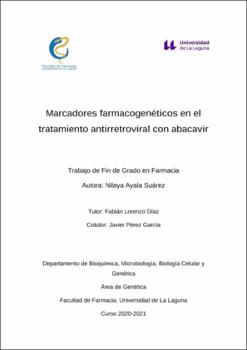Marcadores farmacogenéticos en el tratamiento antirretroviral con abacavir
Autor
Ayala Suárez, NilayaFecha
2021Resumen
El abacavir es un fármaco empleado para el tratamiento de la infección del virus
de la inmunodeficiencia humana, que se engloba dentro de los análogos de
nucleótidos inhibidores de la transcriptasa inversa. El empleo del abacavir se ha
visto limitado debido a una reacción de hipersensibilidad que se produce en el 4-
8% de los pacientes que utilizan este tratamiento. Esta reacción potencialmente
mortal se ha relacionado con diferentes variantes genéticas, la mayoría de ellas
relacionadas con la familia de genes del complejo mayor de histocompatibilidad
(HLA), aunque todavía se desconocen todas las que podrían estar implicadas.
Por ello, el cribado de algunas de estas variantes (marcadores
farmacogenéticos) es una necesidad y una realidad clínica en muchos países
para avanzar hacia una medicina de precisión adaptada al componente genético
de cada paciente. En este trabajo de fin de grado se ha realizado una revisión
bibliográfica de los marcadores farmacogenéticos identificados hasta el
momento para la prevención de reacciones de hipersensibilidad al abacavir.
Además, se ha llevado a cabo una evaluación crítica de las limitaciones
existentes y futuras perspectivas. Actualmente, el haplotipo HLA-B*57:01 es el
marcador farmacogenético más utilizado para prevenir esta reacción de
hipersensibilidad y con mayor evidencia clínica. A pesar de que otros genes se
han asociado a este fenotipo (HLA-DRB1, HLA-DQB1, HCP5, HSPA1L y
ERAP1), todos ellos están relacionados con el HLA-B*57:01. Los estudios del
genoma completo pueden proporcionar nuevos conocimientos sobre los
mecanismos subyacentes a la hipersensibilidad al abacavir para avanzar hacia
la medicina de precisión. Abacavir is a drug used for the treatment of the infection by the human
immunodeficiency virus. This drug is included among the nucleotide analogues
reverse transcriptase inhibitors and it inhibits the viral replication, improve the
proliferation of T Cells CD4+, and enhance the immune system of the patient.
The use of abacavir has been limited due to a hypersensitivity reaction that
occurs in 4-8% of patients using this treatment. This reaction, which can be fatal,
has been linked to different genetic variants most of them related to the human
leukocyte antigens (HLA) gene family. However, all the genetic variants involved
in this hypersensitivity reaction are still unknown. Screening for some of these
genetic variants (pharmacogenetic biomarkers) is needed and it is a clinical
reality in many countries. In this final degree project, a literature review of the
available pharmacogenetic biomarkers of abacavir hypersensitivity reaction has
been carried out, as well as a critical evaluation of the current limitations and
future perspectives. Currently, the haplotype HLA-B*57:01 is the most widely
pharmacogenetic marker used to prevent this hypersensitivity reaction and with
higher clinical evidence. Despite other genes have been associated with this
phenotype (HLA-DRB1, HLA-DQB1, HCP5, HSPA1L, and ERAP1), all of them
are related to HLA-B*57:01. Genome-wide studies may provide new insights into
the mechanisms underlying the hypersensitivity to abacavir to move towards
precision medicine.





